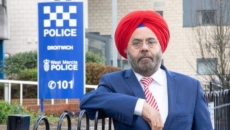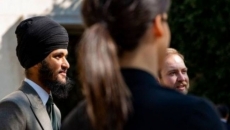Donald Trump likes being on television. But the most dramatic moment of his political career — standing trial in the U.S. capital on charges of trying to subvert democracy — is set to transpire beyond the gaze of cameras.
A growing chorus of voices, including from the former president's own defence team, hopes to convince the chief justice of the U.S. Supreme Court to change that.
"The public not only has a right but has a need to see what happens in that courtroom," said Dan Shelley, president and CEO of the Radio Television Digital News Association.
"The only way the world can have any modicum of trust in whatever the outcome of the case is if they're able to see it and hear it with their own eyes and ears."
The RTDNA has been advocating for American broadcast journalists since 1946, the very same year the U.S. court system first prohibited photography or broadcasting during federal criminal proceedings.
That 77-year symmetry will come full circle when the association leads a coalition to petition the Judicial Conference, a policy-making arm presided over by Supreme Court Chief Justice John Roberts, to make an exception for Trump.
The high court began streaming live audio of arguments back in 2020, at the height of the COVID-19 pandemic. Roberts opted last year to leave the feature in place even after the courtroom doors were reopened to the public.
"It's not too much of a leap to go from that to video," Shelley said.
"But there seems to be something in the DNA of the federal judiciary, particularly most if not all of the nine sitting members of the U.S. Supreme Court, who feel like that would be a step too far. And it makes no logical sense to us."
Trump's own lawyer, John Lauro, has said he would welcome live coverage. And a group of Democrats in Congress also wants cameras allowed at both the D.C. trial and the classified documents trial playing out in Florida.
"Given the historic nature of the charges brought forth in these cases, it is hard to imagine a more powerful circumstance for televised proceedings," the 38 Democrats, including California Rep. Adam Schiff, wrote to the conference.
"If the public is to fully accept the outcome, it will be vitally important for it to witness, as directly as possible, how the trials are conducted, the strength of the evidence adduced and the credibility of witnesses."
Time appears to be of the essence: prosecutors in Washington proposed Thursday that Trump's trial begin as soon as Jan. 2 of next year to "vindicate the public's strong interest" in a speedy trial.
It's only the latest step in a long, meandering journey that has produced a patchwork landscape across the U.S., from networks that offer gavel-to-gavel coverage of state murder trials to federal courtrooms where even cellphones are banned.
It began in the 1930s with the trial for Richard Hauptmann, who was convicted of first-degree murder and sentenced to death in the sensational kidnapping case of famed aviator Charles Lindbergh's 20-month-old son.
"The Lindbergh trial is often blamed as the watershed moment when cameras were pushed out of the courts," said Mary Angela Bock, a journalism professor at the University of Texas at Austin.
"It took until the mid-20th century for various state court systems to allow cameras back at different levels, but the federal courts have resisted it every single step of the way."
It's a far cry from Canada, a country that has only dabbled with cameras — with the odd exception of the Supreme Court itself, which livestreams arguments that are later carried on the Canadian Parliamentary Access Channel.
"Canada has been always, at least at the trial level, more measured," said Janice Tibbetts, a journalism professor at Carleton University in Ottawa who teaches a course on covering Canada's legal system.
"The law profession in Canada is generally pretty conservative. And they have strongly argued against the potential of impeding a fair trial … so I don't think you're going to see Canadian Court TV any time soon."
There are compelling arguments for keeping cameras outside the courthouse, Tibbetts noted, including the protection of witnesses and victims, ensuring the integrity of their testimony and discouraging lawyers from grandstanding.
"There are all of these things that can really change the way a trial happens because there are cameras there to capture it."
And Bock pointed out that amending the rules for a single high-profile accused would risk jeopardizing one of the most sacrosanct principles of the justice system: equal treatment under the law.
"The essence of this particular federal case is that he is not above the law, and therefore must be treated just like everybody else."
Indeed, during a hearing Friday that Trump did not attend, U.S. District Judge Tanya Chutkan made clear to his lawyers that their client would receive no special treatment just because he's running for president.
"If that means he can't say exactly what he wants to say about witnesses in this case, then that's how it's going to be," Chutkan said.
Trump was contesting restrictions proposed by prosecutors who fear the former president's penchant for picking fights on social media could be used to intimidate witnesses or disclose sensitive information.
Chutkan agreed that the protective order need not be as restrictive as the one government lawyers had requested, and instead appeared inclined to limit only the release of certain secret materials, such as grand jury evidence.
Rarely does the sheer magnitude of a trial change how the legal system operates. But prosecuting a former U.S. president — let alone one as outspoken as Trump — is already proving seismic.
"This criminal trial is being conducted in the name of the people of the United States," Neal Katyal, a former acting solicitor general and decorated D.C. litigator, wrote last week in the Washington Post.
"It is our tax dollars at work. We have a right to see it. And we have the right to ensure that rumour mongers and conspiracy theorists don't control the narrative."






